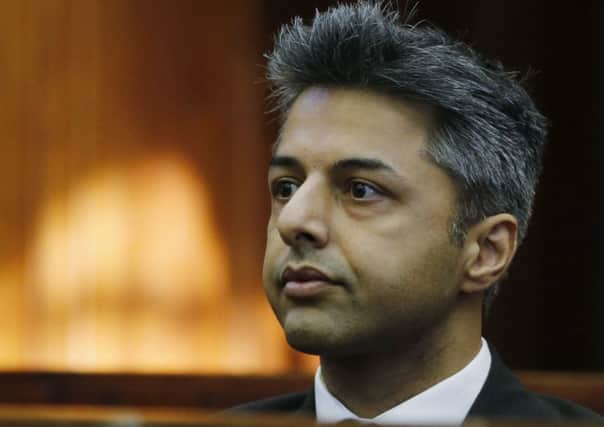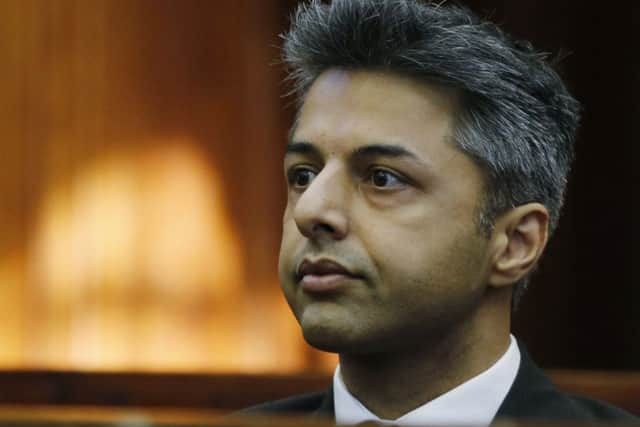Judge clears Shrien Dewani of ordering hit on wife


Prosecutors had argued that Dewani paid 15,000 rand (£830) in a plot with taxi driver Zola Tongo and others to kidnap and murder his wife while they were visiting Cape Town in November 2010.
The prosecution argued that Dewani was secretly gay and had wished to free himself from the marriage.
Advertisement
Hide AdAdvertisement
Hide AdHowever, Judge Jeanette Traverso said yesterday that the evidence presented by the prosecution fell “far below the threshold” upon which a reasonable court could convict.


She dismissed Zola Tongo, the taxi driver and the prosecution’s main witness, as a man “riddled with contradictions” whose evidence was “highly debatable”. In nine words she ended more than four years of uncertainty for Dewani by stating: “The accused is found not guilty of this charge.”
Anni Dewani was found shot dead in the back of their taxi after the couple were hijacked during a late-night tour of a township, during which Shrien Dewani escaped unharmed.
As the businessman from Bristol was taken from the court to prepare for his release and imminent return to the UK, the family of his bride – whose maiden name was Hindocha – bowed their heads and immediately left the courtroom.
In a statement read outside the Western Cape High Court, the Hindocha family said: “We feel really, really sad because we have not heard the full story. Shrien lived a double life.”
Anni Dewani’s sister Ami Denborg said: “The justice system has failed us.”
An emotional Ms Denborg added: “Today we feel really, really sad, because we never heard the full story of Shrien. We heard that Shrien has led a double life and that Anni knew nothing about it. And we just wish that Shrien had been honest with us and especially with Anni.
“The knowledge of not ever knowing what happened to my dearest little sister on 13 November 2010 … that’s going to haunt me, my family, my brother, my parents, for the rest of our lives. We’ve had four years of sleepless nights and … will we ever be able to sleep?
CONNECT WITH THE SCOTSMAN
Advertisement
Hide AdAdvertisement
Hide Ad• Subscribe to our daily newsletter (requires registration) and get the latest news, sport and business headlines delivered to your inbox every morning
“We’ve had tremendous support from the South African public, and many others around the world, and we’re grateful to all of them and thank them from the bottom of our heart. This is a really sad day for us and we hope that no other family will ever have to go through what we have been through.”
Last week brother Anish Hindocha begged Dewani to “tell the world what happened the night she died”.
However, Judge Traverso had ruled Dewani could not be compelled to give evidence. She explained that a defendant was entitled to be discharged if there was no probability of conviction, unless the defendant entered the witness box freely and incriminated himself.
During a statement which took almost three hours to read out yesterday, Judge Traverso said that the evidence of the three men already convicted of Mrs Dewani’s murderwas “so improbable, with so many mistakes, lies and inconsistencies you cannot see where the lies ended and the truth begins”.
Zola Tongo and his accomplices Mziwamadoda Qwabe and Xolile Mngeni were convicted of the murder, with Tongo currently serving 18 years and Qwabe sentenced to 25 years .
Mngeni, who was also sentenced to life, died in October of a brain tumour while in prison.
The judge said all three were “intelligent men” and dismissed the prosecution’s argument that they would carry out a contract killing for what she described as “a few thousand rand”.
Advertisement
Hide AdAdvertisement
Hide AdMonde Mbolombo, whom the prosecution believed was the “link man” between Dewani and the killers, was deemed to be an unreliable witness.
The hotel receptionist had admitted telling lies to the court in order to protect himself when the police began their investigations in 2010. He was granted immunity by prosecutors in return for testifying against Dewani. However, the judge said: “As his evidence progressed, it became more and more clear of his involvement.”
By the time prosecutor Adrian Mopp stood up in Western Cape High Court to begin presenting his case, the defence counsel Francois van Zyl had already spotted the prosecution key argument and ensured it was on the front pages of the newspapers as part of Dewani’s witness statement.
A quirk of the South African legal system allowed the defendant to present his written testimony within moments of Judge Traverso arriving in court on the first day of the trial for the murder of his wife.
“I consider myself to be bisexual,” Dewani disclosed in his plea explanation, read to the court by Mr van Zyl.
The revelation, less than 200 words into a 37-page disclosure, briefly mentioned sexual liaisons with men including German escort Leopold Leisser.
This declaration by the defence rendered the prosecution’s intended probing into Dewani’s sexuality “irrelevant”, the judge said.
Speaking outside the court, South African National Prosecuting Authority spokesman Nathi Ncube said: “Justice is indeed about making sure that where there is a case we successfully prosecute it and where we think there is sufficient evidence to take the matter to court we do so.
Advertisement
Hide AdAdvertisement
Hide Ad“We have successfully prosecuted three people who participated – not just participated but were actually part of the planning and executed the plan. And … the court said it could not rely on the evidence given by three witnesses who themselves had been convicted of the crime.”
Dewani’s trial is the second high-profile case this year to turn the spotlight on South Africa’s judicial system. In October a Pretoria high court sentenced Olympic and Paralympic runner Oscar Pistorius to five years in jail for shooting dead his girlfriend Reeva Steenkamp.
PROFILE
Dewani kept his active gay life hidden from wife
For many a cloud of suspicion will continue to hang over Shrien Dewani.
A Hindu he was born in Bristol and raised in Westbury-on-Trym. He was educated at Bristol Grammar School and the University of Manchester Institute of Science and Technology where he qualified as a chartered accountant before going on to work with Deloitte and in the City of London. In 2005 he left to run the family’s chain of old people’s homes.
He was introduced to Anni Hindocha, whose Hindu family fled Uganda for Sweden in the 1970s, by friends in 2009 and he proposed at the Ritz Hotel in Paris in June 2010. However, Mr Dewani had hidden from his wife his secret life as a bisexual and his affairs with men and use of male prostitutes. The couple married in Mumbai on 29 October and then travelled to South Africa for their honeymoon.
After a four-night stay at the Kruger National Park, they moved on to the Cape Grace Hotel but it was a decision to
see the “real Africa” in a taxi driven by Zola Tongo that led to the VW Sharan taxi being hijacked by two armed men who threw out Tongo and drove the couple around for between 20 to 40 minutes before Mr Dewani was ordered out at gunpoint.
The secret gay life of Mr Dewani was used against him by the South African authorities who discovered that he had surfed gay porn and fetish websites on his honeymoon and as early as 48 hours after his wife’s murder. In order to prevent the prosecution from using his sexuality against him Mr Dewani would later admit to hiring a German prostitute Leipold Leisser.
Advertisement
Hide AdAdvertisement
Hide AdHowever, as Mr Dewani did not take to the witness stand he was never asked to explain CCTV footage from the Cape Grace hotel that appeared to show him twice meeting Tongo in the car park the evening before the hijacking and then meeting him on the terrace of the Cape Grace hotel the day after the murder.
SCOTSMAN TABLET AND IPHONE APPS